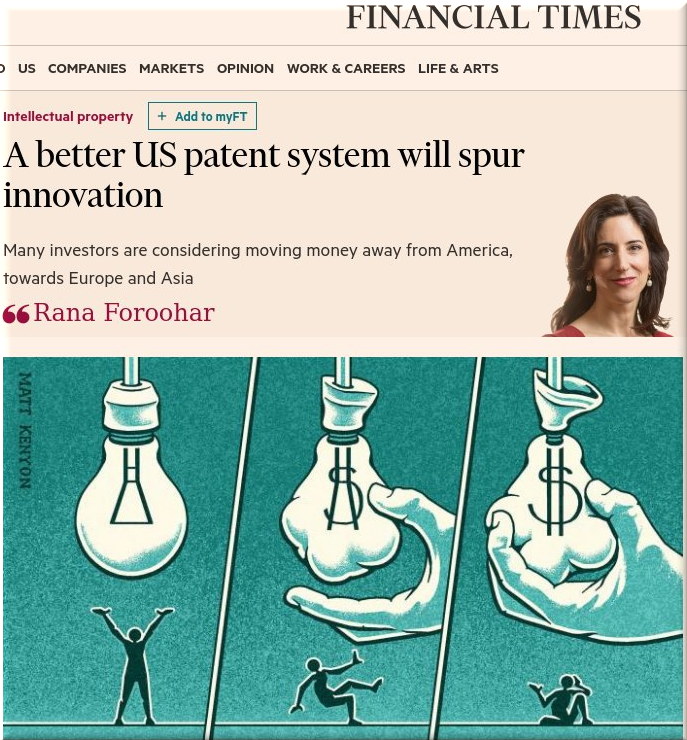

Contrary to the headline, Rana Foroohar advocates a worse US patent system
"Abetter US patent system will spur innovation," says a new headline from the Financial Times this weekend (behind paywall, use Google cache to bypass it). The title is very misleading. One may be tempted to think that it's pro-innovation, but it's actually pro-patent maximalism. It states that some "companies have business models that are very different from, say, life sciences companies or small software suppliers that depend on one or two patents. The iPhone, for example, incorporates technologies involving thousands of patents."
A number of companies began lobbying for even more anti-patent legislation. A worried Mr Kappos pushed back, but was eventually replaced by Michelle Lee — Google’s own former head of patent strategy. In recent years, the PTAB has become a “powerful shield” for those accused of patent infringement, leading former chief judge Randall Rader, who led the court in charge of patent appeals, to label it the “death squad” for IP.
Pushing back on patents has been great for Big Tech, which of course has its own IP to protect, but increasingly monetises data and IP created by others. But the US software supply chain, as well as life sciences, have been collateral damage. While the complexity of global business makes it tough to show clear causality between lax patent protection and the loss of innovation and jobs in the US, the trend lines do not look good. According to one study, the shifts in patent regulation have cost the US economy $1tn. Venture capital money into biotech is sharply down from 2015 to 2016.
Anecdotally many investors say they are considering moving money away from the US, towards Europe and Asia. That is worrisome, since these are exactly the kind of highly skilled jobs that the US should be looking to keep.
Still, the pendulum may be about to shift again. The Trump administration has nominated Andrei Iancu, an LA-based lawyer who has worked with clients in both pharma and Big Tech, to be head of the USPTO. The US Supreme Court will also soon hear a case questioning the legality of the entire non-court patent adjudication system.
It will be a chance for lawmakers to think about exactly what kind of digital ecosystem they want to create.
"...now that the US Supreme Court ۤ 101 is used to invalidate software patents every single week if not every single day it is getting difficult to deny a post-software patents reality in the US."What about software patents?
Well, Jeffrey Rowe, who says he "has more than 40 years of experience in all aspects of industrial design," wrote about the subject of software patents in the context of the USPTO. Having added Torvalds and Stallman videos to his article, he said this just before the weekend:
A couple years ago I got into a pretty heated discussion with a staffer from an engineering software company about whether software patents were still relevant (or is they ever were to begin with).
While proponents (usually with deep pockets) have touted their benefits, software patents have also been used in the software industry to suppress innovation, kill competition, generate undeserved royalties, and make patent attorneys rich. So I’ll ask again, are software patents still relevant?
It’s no secret that the engineering software business is extremely competitive, as it always has been. Without naming names, the engineering software business has also proven to be a very fertile and lucrative ground for lawsuits regarding patent infringement, reverse engineering, and outright copying and pasting blocks of code.
The court denied defendant’s motion to dismiss on the ground that plaintiff’s network gaming patents encompassed unpatentable subject matter because the asserted claims were not directed toward an abstract idea.